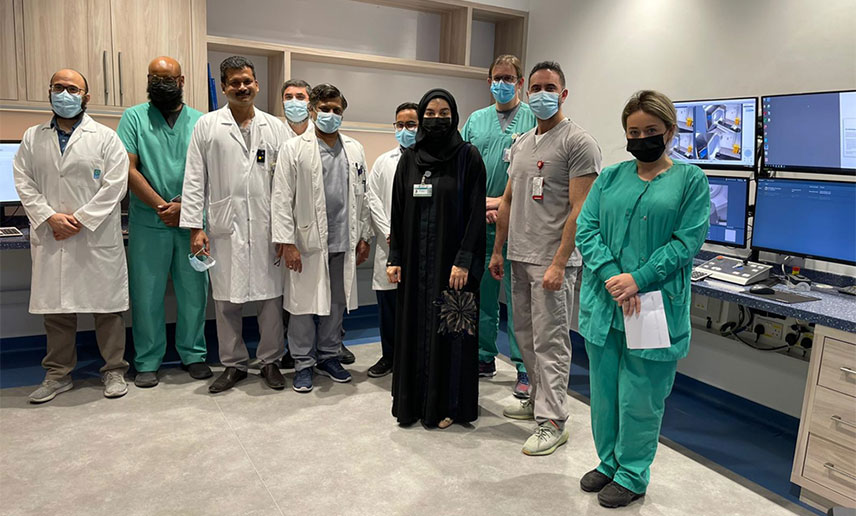
The department of Radiation Oncology at the NCCCR is the only center of its kind in the State of Qatar. Our department provides best possible patient care by integrating patient care, research and education.
The advanced devices and technology existing in our department gives patients access to state-of-the-art cancer radiation treatment for a wide variety of tumor types. The radiation therapy treatment, which is guided by medical imaging such as CT, MRI and/or PET/CT, aims to destroy cancer cells while sparing healthy tissues using external or internal radiation therapy. The devices available in our department for delivering the radiation are:
- Ethos™ LINAC: The first system in GCC which is an artificial intelligence-powered system designed to deliver fully adaptive radiation therapy treatment within 15-minute timeslot
- Cyberknife®: It is an advanced form of cancer therapy and the first and only fully robotic radiotherapy device.
- Two LINACs: Devices most commonly used for external beam radiation treatments for patients with cancer. It delivers high-energy x-rays or electrons to the region of the patient's tumor.
- MRgFUS HIFU: High-intensity focused ultrasound (HIFU) is a Magnetic resonance guided treatment non-invasive therapeutic technique that uses non-ionizing ultrasonic waves to heat or ablate tissue.
- HDR Brachytherapy: It is internal radiotherapy which involves inserting thin tubes and/or needles with radiation source into the area to be treated.
Our Radiation Oncology team uses these devices to treat cancer based on the most advanced technologies such as:
- Intensity-modulated radiation therapy (IMRT): It is an advanced type of high-precision radiotherapy that uses computer-controlled linear accelerators to treat cancer tumors.
- Stereotactic radiosurgery (SRS): Non-surgical radiation therapy used to treat cancer of the brain.
- Volumetric Modulated Ars Therapy (VMAT): a novel radiation therapy technique that delivers the radiation dose continuously as the treatment machine rotates.
- SBRT: Non-surgical radiation therapy performed on the body rather than the brain.
- Adaptive RT: A method enabling the treatment to adapt to the variation observed on the patient.
- Total body RT (TBI): Radiation is given in a way to cover the whole body
- Total Skin Electron therapy (TSET), an effective form of radiation-based treatment some types of cutaneous T-cell lymphoma

The highly competent team of Clinicians, Medical Physicists, Radiation Oncology Therapists, Medical Dosimetrists and Oncology Nurses are trained from leading cancer care centers with immense clinical experience. This highly competent team comes from diverse background and brings with them the best practices across the world and is capable to meet the clinical, cultural and emotional needs of patients and care providers. Team strongly adheres to Evidence based medicine and multi-disciplinary team approach involving patients and relatives in providing the appropriate care for each patient. There are 16 sites specific Multi-disciplinary committees which meets at very frequent intervals in discussing each patient detail before commencing the treatment following the international and national cancer treatment guidelines and protocols.
The Department of Radiation Oncology at the NCCCR is heavily involved in several research projects aimed at improving the care of cancer patients in collaboration with other departments and with other national and international institutions including Texas A&M university in Qatar and the University Hospital of Bern in Switzerland. The focus of these research projects is centered on how to guide the radiation therapy using multimodal imaging technologies in order accurately deliver radiation to patients.

Finally, our department has invested great effort in the development of educational activities. As such, we currently train and mentor in our department several medical residents from Weil Cornell university of medicine in Qatar. We also provide educational rotations for medical fellows as part of their training, with face to face lectures and hands-on practice. In addition, our department has participated and initiated several courses for education purposes including monthly education course on the physics and clinical aspect of radiation oncology which are accredited by DHP and eligible for CMEs.

Our department is highly patient centered, trying to go above and beyond the expectations of patients and care givers by meeting the cultural and psychology safety, physical safety, patient confidentiality and patient’s rights at every touch point. The Net Promoter Score (NPS) of the Department is above 80, which is at par and above the industry standards.
